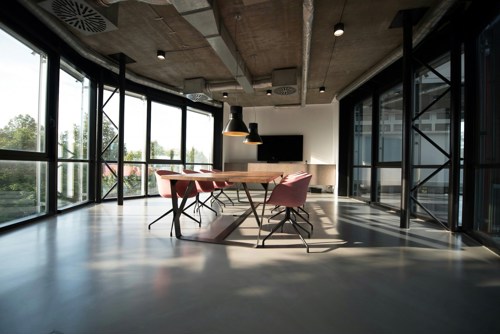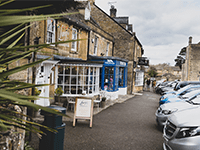
Have you thought about buying a business property to rent out to tenants? That's what commercial property investment is. It involves buying a business property to generate rental income.
But how do you do this, and what kind of mortgage do you need? This guide will help you understand commercial investment mortgages.
What are commercial investment mortgages?
It's a type of commercial mortgage used to buy a business property that you'll rent to another company. For example, if you buy an office and rent it to another business, you would need this type of mortgage.
If you plan to buy the property for your business operations, you would need an owner-occupier commercial mortgage instead.
Types of commercial investment mortgages
There are various types of mortgages available, including interest-only and capital repayment.
An interest-only commercial mortgage means you pay only the interest back each month. This means your monthly payments will be lower, as you won’t be reducing the loan balance. It frees up cash for other expenses, which can be useful for some investors. However, it means you'll need to pay off the full loan amount at the end of the term.
On the other hand, a capital repayment mortgage is where you pay both the interest and the loan balance each month. This usually leads to higher mortgage payments, as you are lowering the loan balance. However, it means that by the end of the term, you will own the property.
Deciding on the best product depends on your needs, so it's good to carefully think about what would work well for you.
Why consider investing in commercial property?
Investing in business properties can be a lucrative venture with a range of benefits. Some of these include:
- Rental income: Business properties often offer higher rental returns than other types of properties. So, you may be able to make more money from these investments.
- Longer-term leases: Businesses typically want stability and are less likely to move frequently. This can lead to longer-term leases, giving you more stability and peace of mind.
- Diversification: If you’re an experienced property investor, adding commercial properties to your portfolio can help you diversify and may reduce your risk.
What are the risks of commercial property investment?
While investing in this type of property can have its advantages, there are also risks to consider:
- Management responsibilities: As the building owner, you may have to address any tenant problems that arise.
- Market fluctuations: Property investments can be profitable, but they are sensitive to market changes. For instance, an increase in interest rates can impact your rental returns.
- Selling challenges: If you choose to sell the property when market conditions are not good, it could take longer to sell and may result in a lower sale price.
What are the commercial investment mortgage rates?
Interest rates may vary based on your situation. If you're seen as a lower risk to the lender, you'll likely get better interest rates. However, if you’re considered to be a higher risk, expect higher rates.
Market conditions also affect interest rates. When the Bank of England raises the base rate, overall interest rates go up. On the other hand, when the base rate falls, interest rates tend to drop.
There are two main types of interest rates: fixed-rate and variable-rate mortgages. A fixed-rate mortgage means your mortgage payments remain consistent over a set term, and the interest rate does not change.
On the other hand, a variable-rate mortgage can change with the market. This means your monthly payments can vary, making budgeting harder. However, good market conditions can lead to lower interest rates, which may help you make some savings.
How much can you borrow with a commercial investment mortgage?
The amount you can borrow depends on several factors: the lender, your deposit size, and your financial situation. Lenders assess these elements to decide your loan amount. Some lenders have no limit on maximum loan sizes because they understand these properties can be expensive and may require larger loans. Others may cap the amount they lend based on risk assessment.
Typically, lenders need a deposit of at least 25% of the property price. Offering a larger deposit can make you eligible for more attractive deals, so it's beneficial to put down as much as possible.
It’s wise to explore various options and not settle for the first lender you find. Shopping around and comparing offers may uncover better solutions and allow you to borrow more.
Where can you get a commercial investment mortgage?
These mortgages can be accessed through lenders, brokers, or banks. Going directly to a lender or bank can be useful if you know what type of product you need and are ready to apply. However, they often have set products and criteria, so if you don’t meet their requirements, your options may be limited.
Using a broker, on the other hand, gives you access to a panel of lenders. This means they can search through various products to find one that suits you. However, using a broker might involve an extra fee, potentially making it more expensive than going directly to a lender.
Am I eligible for a commercial investment mortgage?
If you're looking to buy a business property for investment purposes, you might be eligible for this type of mortgage.
Each lender has different criteria, so comparing options is important. Some lenders may be more flexible than others, so you might qualify with one but not another. Speaking with a mortgage broker can be helpful, as they have access to multiple lenders and can guide you on who may be likely to accept you.
Summary
Investing in commercial properties offers great potential, but it's essential to approach it with a clear understanding of mortgage options and the risks. Take the time to explore various lenders and products to find the right solution for you. By carefully weighing up your options and doing thorough research, you can make an informed decision.
Any property used as security, which may include your home, may be repossessed if you do not keep up repayments on your mortgage.




